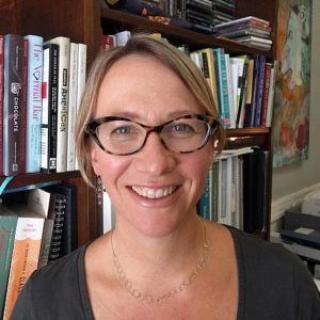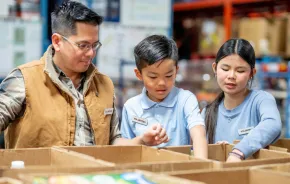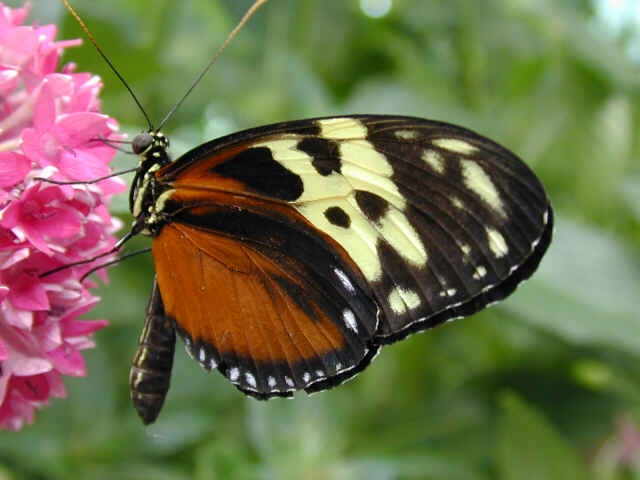
As life sciences manager at the Pacific Science Center (PSC), Sarah Moore cares deeply about all the creatures she oversees, from mealworms to naked mole rats to — perhaps the most well-known aspect of her job — the butterflies at Pacific Science Center's Tropical Butterfly House. At the core of her work is a passion for promoting respect and understanding for all living things.
After nearly 20 years at Pacific Science Center, Moore has overseen lots of change in the Center’s animal exhibits. She says that when she first started, the exhibits functioned more like a petting zoo. Moore has worked to create environments that encourage science exploration, citing that as her main goal. “I find that I’m less interested in facts and knowledge and more focused on learning and discovery,” she says.
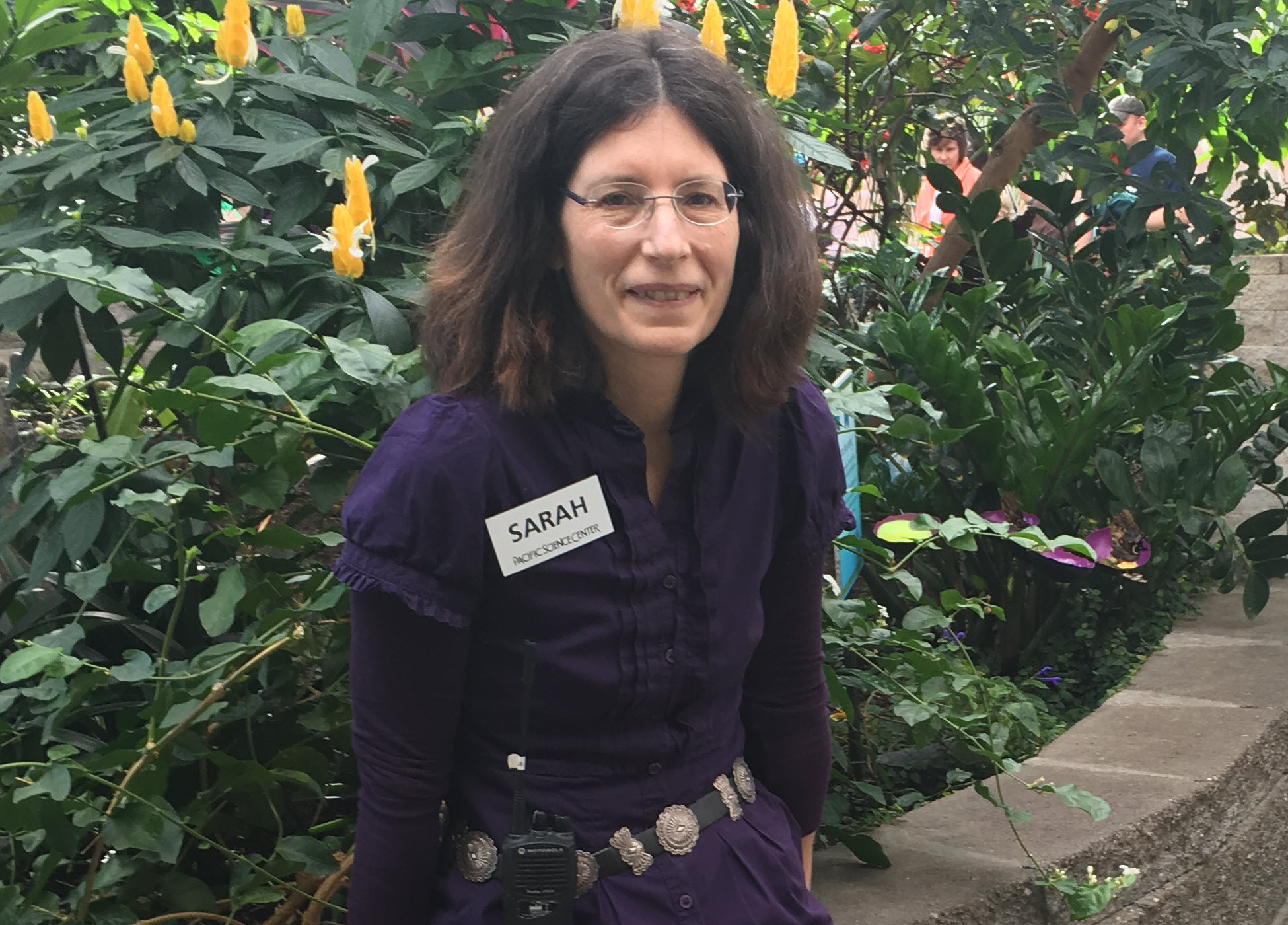
Moore employs a similar philosophy in parenting her 14-year-old son. She says that she works to model problem-solving through regular communication about her own challenges. “I’m doing a lot of the same things that my son is. It’s just that I’m doing it in a grown-up context and he’s doing it in a kid context. I think if kids always see grown-ups being perfect, they don’t see a path to get there.”
Moore happened upon her career at PSC somewhat accidentally. After graduating from college with a degree in biology, she realized that what she really loved were "whole organisms." That led to animal-care positions at places such as Seattle Humane Society. Then after responding to an ad for a job as a science explainer — “A job explaining science? How fun is that?” — she began her work at Pacific Science Center. She gradually transitioned into animal care and in the mid-1990s, she was tapped to lead development of the Pacific Science Center's Tropical Butterfly Bouse, which opened in 1998.
The 4,000 square-foot immersive exhibit gives Seattleites a chance to experience a place very unlike Seattle — a warm, tropical climate where colorful butterflies are active 365 days a year. Not surprisingly, the exhibit is extremely popular. On a grey, drizzly day, visiting the warm, airy room — filled with vibrant flowers and weightless, drifting butterflies — feels like a mini-vacation. Moore says that the warmth “helps people relax and observe things.” She sometimes thinks of her work as creating “different habitats for people to learn.”
But her work in the Butterfly House is only part of her work at PSC. Moore's newest charges, for example, are fluffy, yellow, newly hatched chicks. She explains that she got the idea of incubating chicken eggs in the dinosaur exhibit from her stepdaughter who once commented that adolescent chickens molting their feathers looked like they were “turning into dinosaurs.” Moore thought this could be a great way to demonstrate the evolutionary link between birds and dinosaurs. “It’s easier to show it than to say it,” she says.
Taking time from her demanding schedule, Moore answered a few of our questions about her ever-evolving work at Pacific Science Center.
Describe a typical day in your work here at the Pacific Science Center.
(She laughs) There’s no such thing! There’s a fun, unexpected quality to working in a place where people are always visiting and I’ve learned to fold in a little extra time to do the things that would be behind the scenes, but I’m doing them around people. I do a lot of support for the exhibits to keep them maintained the way they are and to think about how they can tell the stories that they have to tell. I’m not necessarily out there feeding the iguana, but more looking for what’s next.
Are any exciting new things coming up?
Something new we’re going to start doing is posting one activity every day that our staff do with the animals and the plants. So that might be pollinating the cacao plant or it might be feeding something or giving the iguana a shower. Something that we do every day and we’d like to invite a little audience to come and watch and ask questions.
What would surprise people about the Tropical Butterfly House?
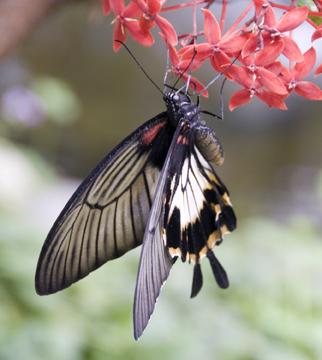
The biggest surprise for me and I think for others is that some people are uncomfortable around butterflies. Not many people think about it beforehand, but when they go into a space with butterflies, the sensation of having things fly around their faces can be a bit intense for some people. Usually if they step outside and return, they enjoy themselves the second time.
What’s your favorite part of your job?
If we took care of all these plants and animals and nobody ever saw them, there’d be no point. It’s really the interface between the organisms we’re taking care of and the discoveries that people make and the dots they connect in their mind when they come here. Hearing kids using their logic skills and their thought processes is just really refreshing.
How does being a mother inform your work?
A lot! I think that when you learn in school, you’re always pursuing a specific objective and I watched my child sometimes being frustrated by it. I think free-choice learning is a really wonderful alternative and to just give yourself a break sometimes and to remember that learning can be an end to itself. I think the ability to just be in the world and take it in is a great gift and I’m happy to provide that for people while they learn.
Finding the balance is hard. It’s ongoing. You find the balance and then you find it again and again.
What does your son think about your job?
So far so good. When he was little he would say, "Mom, pretend that I’m a naked mole rat and that you are Sarah Moore who is taking care of me." As he got older, I kept waiting for him to get embarrassed because I know people who have really cool (similar) jobs and their kids say, “Don’t show up in the zoo van!” But so far, he still seems proud of what I do. He likes to visit. He loves our traveling exhibits. I think he views getting to see IMAX shows as a huge perk! But we also have a shared love of science.
You are clearly very passionate about what you do. How do you balance motherhood with your career?
I think no matter how much you love everything, the more you like it, the more helpings you want of it. And you’re going to hit a point where you just put too much on your plate and you have to prioritize and take deep breaths and work it all out. Finding the balance is hard. It’s ongoing. You find the balance and then you find it again and again. It’s not something you can do once and then have it work forever afterward.
What do you do for fun?
I have goats and chickens (see mention of Moore in this article about Seattle Farm Co-op). I like to garden. And I hike. I’m actually going with my son to Philmont High Adventure camp in New Mexico this summer for a 12-day hike, so I hope I’m ready for that. Read and write. That’s about it. I think I just ran out of hours in the day to do things.




